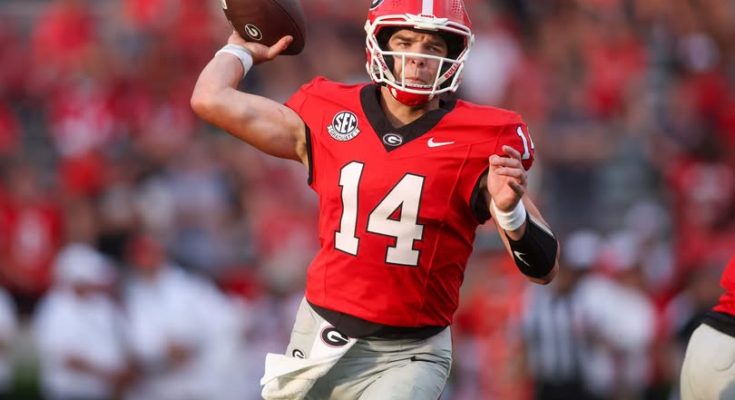Georgia’s Quarterback Crisis: Gunner Stockton’s Decision‑Making Is Broken—Here’s the Brutal Fix Before Tennessee Crushes UGA
Georgia fans, buckle up—what we’re seeing from Gunner Stockton at quarterback isn’t just growing pains. His decision-making on the field is broken, and if the Bulldogs don’t repair it before facing Tennessee, Georgia’s vaunted offense could collapse under SEC pressure. Luckily, there are concrete steps the coaching staff can take—and fast.
Let’s be clear: this isn’t about loyalty or hype. Gunner has heart and leadership—no one doubts that. Coach Mike Bobo even praised him as a “gunslinger” who comes at every drive ready. But when that aggression turns into hesitance, overly conservative reads, and a refusal to push the ball downfield, it stalls the offense—especially with scant explosive plays.
Here’s what’s going wrong, according to film study and recent games: over two weeks, Stockton has launched only three passes beyond 10 yards, and zero completions over 20 yards. The offense limps forward on screens and cafés—all while elite SEC defenses smother that predictable rhythm. David Pollack put it plainly: without a legitimate ground game and play-action, this offense will be dismantled.
So how can Georgia fix this—or fast?
First, get Stockton comfortable with before-the-snap reads. The coaching staff must double down in practice on progression reads, moving beyond checkdowns. This is critical before Tennessee’s top-tier front seven. Smart must strip away safe routes and inject high-percentage intermediate throws—keep the ball away from the line of scrimmage, where Stockton currently bounces it almost religiously.
Second, simplify and tailor the offense to his strengths. Instead of trick plays or generic calls, run RPOs, play-action boots, and read-option packages that allow Stockton to use his athleticism and arm without abandoning structure. Let him make decisions on the move, test his processing in game-paced reps—command urgency, not panic.
Third, restore the ground game. Georgia’s offensive line must be mobile and physical—pound it in with combo blocks, pulls, and zone schemes that give the illusion of a run-heavy offense and open up play-action downfield. If defenses respect the run again, Stockton won’t be forced with “shoot the ball or die” decisions.
Fourth, increase situational reps. Two-minute drills, red zone scenarios, third-and-manageable—Stockton must drive these in practice like he’s driving the offense. Smart confirmed they’re giving him more reps each day—but the coaching staff must ramp that up and create urgency, fatigue, and pressure in practice, so he can thrive under fire.
Fifth, open the offense ride. Let Stockton trust his arm. Yes, he’s been comfortable with Colbie Young under 5 yards, but reaching linebackers and safeties with layered routes should be on the menu. It’s time to graduate from the bubble screens and let receivers stretch the field. Zone concepts, high-low reads, four‑vert combinations—all tools to force defenses to honor the arm.
And if that still isn’t enough, here’s a final jolt: bring in competition. Rookie reps from Puglisi or Rashada won’t fix everything, but if Stockton knows his job isn’t guaranteed, he’ll process faster and play with more urgency. Right now, Georgia can’t afford auto-pilot QB decisions once Tennessee lands on their door.
The clock is ticking. Tennessee brings an electric Neyland Stadium atmosphere and one of the SEC’s most disruptive defenses. If Stockton’s decision-making doesn’t sharpen quickly, Georgia’s offense could fold under the pressure in a way we haven’t seen under Kirby.
This isn’t anti‑Stockton rhetoric, but an urgent call to arms: UGA needs him to grow up physically and mentally before it’s too late. Because right now, his broken decision-making is the biggest threat to Georgia’s season—unless it’s fixed.



